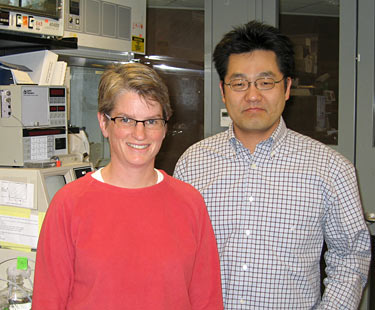Authors Erin K. O’Shea (left) and
Recent work by the O’Shea lab offers new insight into metabolic processes. Cell metabolism engenders many secondary products, metabolites, that play crucial roles in regulating biological processes. A recent paper from the O’Shea group, Lee et al., concentrates on one group of metabolites, inositol polyphosphates (IPs). These are soluble signaling molecules, found in all eukaryotic cells, that contain a six carbon inositol ring decorated with different numbers of phosphates. IP3, containing three phosphates, is produced by hydrolysis of phosphatidylinositol bisphosphate and can be phosphorylated by evolutionarily conserved inositol polyphosphate kinases to produce IP6, in which all inositol ring positions are phosphorylated. Although IP3 and IP6 have well characterized roles in regulating calcium release and mRNA export, respectively, the roles of other inositol polyphosphates are unclear.
Lee et al. recently defined a new role for the inositol polyphosphate IP7, which contains a pyrophosphate group (2 phosphates linked together) on one of the inositol ring positions. They demonstrated that IP7 regulates the activity of a cyclin-CDK-CDK inhibitor complex involved in relaying information about availability of the nutrient inorganic phosphate. This finding resolves a longstanding question about how cells communicate information about phosphate availability to a cyclin-CDK complex that is a central player in the phosphate-responsive signaling pathway. In response to starvation for phosphate, cells increase IP7 levels and IP7 binds to the cyclin-CDK-CDK inhibitor complex and inactivates its kinase activity. This inhibition is a key regulatory step, because it allows the transcription factor Pho4, a substrate for the cyclin-CDK complex, to be unphosphorylated and thereby turn on expression of phosphate-responsive genes.
This work demonstrates a new mechanism for regulating cyclin-CDK activity, and also provides a glimpse of the complex metabolic network that underlies phosphate sensing and signaling. Given the conservation of inositol polyphosphates, it is probable that inositol polyphosphates regulate many other biological processes.
article title: Regulation of a Cyclin-CDK-CDK Inhibitor Complex by Inositol Pyrophosphates


